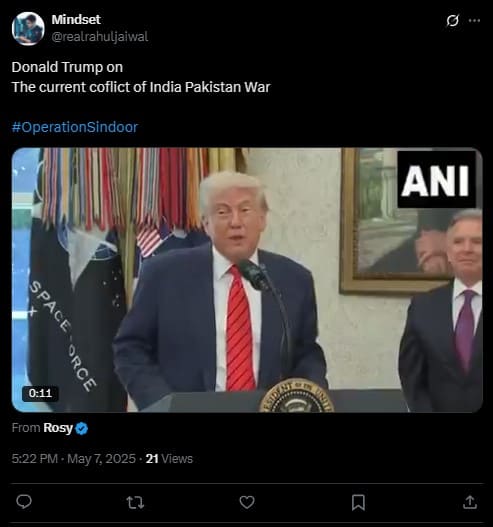Tensions between India and Pakistan escalated sharply following India’s launch of Operation Sindoor on May 6, 2025.
The Indian Air Force targeted multiple sites in Pakistan and Pakistan-administered Kashmir, claiming it was a response to a deadly April 22nd terrorist attack in Pahalgam, Kashmir that killed 26 civilians.
Pakistan denied any involvement in the attack and retaliated by downing Indian jets and highlighting civilian casualties from the Indian strikes.
Major Highlights
- India’s Operation Sindoor targeted 9 Pakistani sites after a Kashmir attack.
- Pakistan retaliated, claiming to have shot down Indian aircraft.
- Donald Trump called the conflict “a shame” and urged for a quick end.
- Critics argue his response lacked seriousness given nuclear risks.
- U.S. diplomacy led by Secretary Marco Rubio is pushing for calm.
- Global powers are closely watching and urging restraint.
Trump’s Brief Statement: “It’s a Shame”
Former U.S. President Donald Trump offered a short comment when asked about the conflict. He called the situation “a shame” and said he hoped it “ends very quickly.”
While his response was widely circulated, it drew criticism for lacking depth and clarity, especially given the high-risk nature of the conflict between two nuclear-armed neighbors.
Criticism Over Vague Response
Trump’s minimal remarks stood in contrast to the gravity of the situation. Many critics questioned whether the U.S. under his leadership would have taken a more active role in defusing the crisis or applying diplomatic pressure.
International affairs analysts expressed concern that Trump’s response may reflect a broader trend of disengagement from complex global issues.
U.S. Diplomacy and Global Reaction
Current U.S. Secretary of State Marco Rubio has reportedly been in contact with both Indian and Pakistani diplomats, urging de-escalation and emphasizing peaceful dialogue.
The State Department confirmed that it is “monitoring the situation closely” but has issued no formal assessment or policy response.
Other global leaders from the European Union, United Kingdom, China, Russia, and Turkey have also issued calls for restraint, warning of potential destabilization across South Asia.
